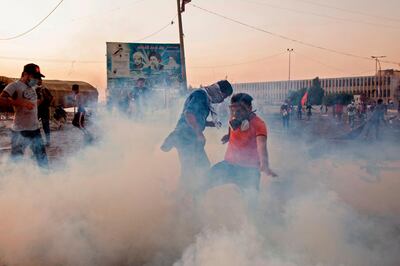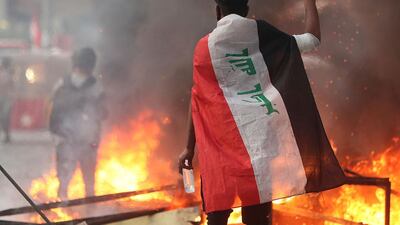The violence against protesters in Iraq has now reached a tragic low. In just six weeks of demonstrations, more than 300 people have been killed and 15,000 more have been injured, according to the Independent High Commission for Human Rights of Iraq (IHCHR).
Those on the streets are protesting against unemployment, poor basic services, widespread corruption, militias controlling many parts of the country and an inefficient political elite, many of whom are puppeteered by Iran. Demonstrators have called for prime minister Adel Abdul Mahdi to step down and for an overhaul of the sectarian-based political system established after the 2003 US-led invasion of Iraq. But their demands for a better tomorrow have been met with brutal repression at home, and large indifference abroad. Security forces and state-sponsored militias have attempted to run people over, used live ammunition and snipers to kill unarmed civilians and fatally shot protesters in the head with tear-gas canisters. Prime minister Abdul Mahdi has promised that those operating outside of the law will be prosecuted, but his vague statement is of no comfort to those who are still being killed and injured by his very own government.
Instead of engaging in a peaceful dialogue with protesters, the government has extended its crackdown on the rights of Iraqis, after a host of reforms promised by Mr Abdul Mahdi failed to appease protesters. In addition to the widespread use of violence, authorities have resorted to censorship, blocking the transmission of a satirical TV show and limiting access to the internet for the past week. But these desperate attempts to quash dissent will not solve the crisis, nor will they intimidate Iraqis into submission.
This has only succeeded in highlighting the failures of the Iraqi political system and its inability to look after the very people it is supposed to protect.
Protesters are undeterred by the bloodshed and the Iraqi government unwilling to change its ways, leading the country into an impasse.
While the responsibility for the current situation lies with the Iraqi state, repression and corruption has been empowered by Iran’s nefarious interference in the country’s affairs, an issue which protesters have risen up against. There are reports that the Popular Mobilisation Front (PMF), an umbrella of mostly Iran-backed militia who once helped liberate Iraq from the rule of ISIS but now act as proxies for Tehran, have actively participated in the deadly crackdown against protesters. Their political wing has also played a nefarious role in the stalemate between protesters and the government. When demonstrations first erupted in October, Islamist Shia political parties were divided. Populist cleric Muqtada Al Sadr who heads Sairoun, the largest coalition in parliament, threw his weight behind the protests and joined the call for Mr Abdul Mahdi to step down and Iran’s influence to be curbed. Mr Al Sadr had sought to convince Hadi Al Amiri of the Fatah Alliance, a coalition representing the PMF that is also the second largest in parliament, to join forces with him in demanding Mr Abdul Mahdi’s resignation.

But he has refused to do so and now, both groups seem to have rallied around the Iran-aligned premier after a series of meetings led by Major General Qassem Soleimani, the head of the Islamic Revolutionary Guards Corps’ Quds Force, an elite unit that oversees Tehran’s proxies and allies. This leaves people on the streets deprived of representation from the very parliament they voted for, as the IRGC decides their fate behind closed doors.
Iraq is OPEC’s second biggest producer, but its oil wealth is lost on most Iraqis, one in five of whom live below the poverty line. The people of Iraq have every right to demand a better life. This goal is not out of reach, nor is it too much to ask. It is the responsibility of Mr Abdul Mahdi and his government to stand up for their people, end the bloodshed and refuse that the hopes and dreams of Iraqis be sold out to Tehran’s powerlust or corrupt officials.

